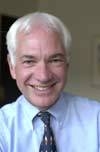Provost Robert A. Brown has named Professor Claude R. Canizares as associate provost, succeeding Professor Phillip Clay.
Canizares is the Bruno Rossi Professor of Physics and has been the director of the Center for Space Research since 1990. He is the associate director for MIT of the Chandra X-ray Observatory Center.
As associate provost, Canizares will assume primary responsibility for the oversight of MIT Lincoln Laboratory on behalf of the provost, and will play a major role in the Institute's relationships with the federal government, particularly the major funding agencies in the executive branch.
He also will assume responsibility for space usage and planning. In this capacity, Canizares will chair the Institute's Committee on Resource and Space Planning and will be involved in planning academic capital projects. He also will assume the traditional duties of the associate provost, including handling confidential investigations on behalf of the president and the provost.
"I am very pleased to have Claude accept this position," Brown said. "His wide range of talents and experience will greatly enhance the Provost's Office. Claude joins us at a time when effective academic planning for space utilization, allocation, renovation and construction is more essential than ever for MIT. I look forward to working with him."
President Charles M. Vest said, "Claude Canizares is a broadly experienced and highly respected member of the MIT faculty. He brings to the senior administration a wealth of experience ranging from service and leadership on many national scientific advisory committee, to service as chair of our Council on Family and Work. We are fortunate that he has agreed to serve in the important role of associate provost of the Institute. I look forward to working closely with him."
Canizares commented, "I am excited about this opportunity to work closely with the president, provost and others on issues that can help shape the future of the Institute. This is a time of change and renewal for our campus, and a time of new challenges and opportunities in our relationship with the federal agencies that support much of our research. I'm also looking forward to maintaining and strengthening our ties to Lincoln Lab, to our mutual benefit."
Canizares, 56, received the B.A., A.M. and Ph.D. degrees in physics from Harvard University. He came to MIT as a postdoctoral fellow in 1971 and joined the faculty in 1974, progressing to professor of physics in 1984.
His main research interests are high-resolution spectroscopy and plasma diagnostics of supernova remnants and clusters of galaxies, cooling flows in galaxies and clusters, X-ray studies of dark matter, X-ray properties of quasars and active galactic nuclei, and gravitational lenses.
He is a member of the National Academy of Sciences, a fellow of the American Physical Society, a member of the International Academy of Astronautics and a fellow of the American Association for the Advancement of Science. He has authored or co-authored more than 170 scientific papers.
Canizares is a member of the board of trustees of the Associated Universities Inc. and serves on the Board on Physics and Astronomy of the National Research Council and the Air Force Scientific Advisory Board. He served on the NASA Advisory Council and was chair of the Space Studies Board of the National Research Council and NASA's Space Science Advisory Committee.
He is a principal investigator on NASA's Chandra X-ray Observatory, leading the development of the High Resolution Transmission Grating Spectrometer for this major space observatory. He also has worked on several other space astronomy missions, including as co-investigator on the Einstein Observatory, known as HEAO-2.
Canizares, a native of Tucson, Ariz., grew up in Yonkers, N.Y., and now lives in Brookline. He has two grown children.
A version of this article appeared in MIT Tech Talk on September 12, 2001.






